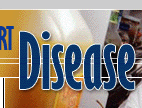Heart disease has been researched extensively for centuries, yet it remains the leading killer of Americans. Cardiac diseases claim more than 910,000 lives a year.1 The National Institutes of Health approves nearly $2 billion a year in research grants for heart disease2, so why do researchers continue to come up short?
EXPERIMENTS ON ANIMALS
Coronary artery disease is the most common cardiovascular ailment in humans and dominates heart disease experiments. Only humans naturally develop coronary artery disease, yet millions of animals suffer through painful experiments in the search for a cure. Dogs, rats, hamsters, and other animals are locked into laboratory cages and artificially manipulated to exhibit human symptoms of heart disease. These animals endure:
genetic alterations;
manipulated diets;
manipulation and invasive monitoring of their metabolisms;
injections with vitamins, lipoproteins, drugs, and many other
substances, in concentrated and high doses;experimental surgeries on components of their cardiovascular system;
experimental transplantation of organs
Click here to read more about heart experiments on animals.
The search for a miracle drug has pharmaceutical companies aggressively competing for the profits such a drug would afford. This frenzy has drug companies testing numerous experimental medications, killing millions of animals every year. Animals in these laboratories spend their short lives locked in cages, given test drugs, observed, killed and dissected. If painful side effects are noticed, they are logged and nothing more; to administer pain relief would be interfering with the study.
Click here to learn more about drugs and heart disease.
DANGERS IN GENERALIZING FROM ANIMAL TO HUMAN
Billions of tax dollars pay for these experiments, yet 4,000 people have heart attacks every day. Clearly, animal experiments are not providing the useful and valid information we need. The previous section, “Drug Testing on Animals,” conveys the human health risks associated with the pharmaceutical industry. Here we examine other experiments and their effects.
Click here to read why so many humans continue to suffer and die from heart disease.
REPLACING ANIMALS IN HEART DISEASE RESEARCH
Since animals do not naturally develop most human cardiovascular diseases, it makes sense to replace the animals in these experiments with accurate methodologies. Unlike animal-based experiments, non-animal research methods provide legitimate, valid results that can be accurately applied to humans.
Click here to see where tax dollars should be focused.
1. American Heart Association, Heart Disease and Stroke Statistics - 2006 Update, (Dallas, TX: American Heart Association, 2006), 2.
2. Neil Munro & Merilyn Werber Serafine, "National Institutes of Health Feels Budget Squeeze," National Journal (April 2006).
This website is dedicated to the memory of Matt Fancera.










